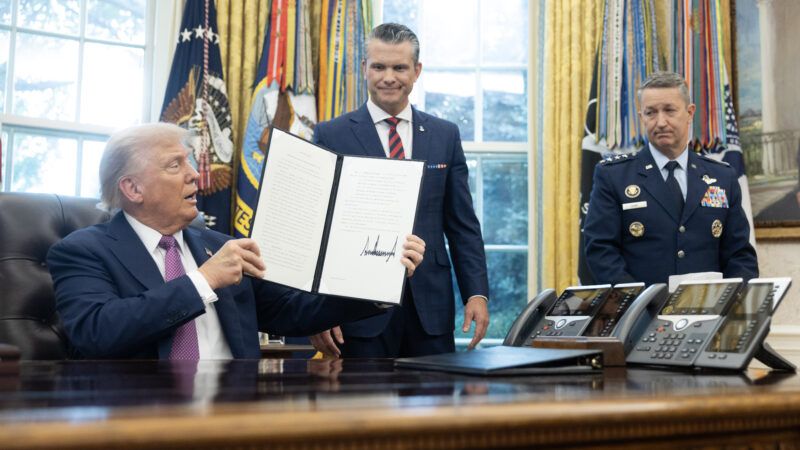Trump Says Tariffs Are About National Security. Pentagon Officials Say They Need a Tariff Exemption.
It turns out that free trade is essential for the military too.

Dating back to his first term in office, President Donald Trump has framed his tariff policies as essential for American national security.
Sometimes that connection has been quite direct. Tariffs on steel and aluminum were imposed because the White House believed the U.S. needed a robust domestic supply of those metals to meet military needs in the event of a war (even though a hypothetical war that cuts off aluminum imports from Canada and other allies is pretty difficult to imagine). In other cases, the logic has been even more strained—like when the White House tried claiming that furniture, cars, and even foreign-made movies are somehow a national security threat.
Nevertheless, the "national security" argument clearly has been foundational to Trump's trade policies. Higher tariffs will make America's military more self-sufficient and capable against future threats; that's the White House's point of view.
One problem: that's not how the people actually in charge of America's national security see it.
"The Defense Department routinely acquires items and materials from foreign sources indispensable to meet defense needs that are not readily available or produced in sufficient quantities within the United States," wrote John Tanaglia, director of pricing, contracting, and acquisitions for the Pentagon, in a memo dated August 25.
The memo instructs other officials at the Pentagon to provide "duty-free entry certificates" to military purchases that would otherwise be subject to tariffs. Doing so, the memo explains, will "maximize the Department's budget to meet warfighter needs."
First and foremost, that's yet more proof that tariffs are raising costs for American purchasers of foreign goods. And it is true, of course, that Trump's tariffs are straining budgets everywhere. Being able to ignore those costs must be nice—many, many businesses across the United States surely wish they had the power to simply wave away those costs as easily as the Pentagon apparently can.
Congress is moving to codify the Pentagon's tariff exemption as part of the new National Defense Authorization Act (NDAA). Language in the bill, which is currently awaiting a vote in the Senate Armed Services Committee, would allow "defense-related acquisitions" to "remain exempt from any tariffs or trade restrictions." The bill also urges the Pentagon to "ensure that future trade actions do not hinder defense procurement or compromise national security priorities."
On the one hand, that's a laudable effort aimed at efficiently using taxpayer money.
On the other hand, it ought to raise some big questions about the narrative that the White House is pushing. If the tariffs are necessary to raise the cost of imports so American-made products are more attractive in the market, shouldn't that same mechanism apply to the Pentagon's purchases?
Indeed, given the focus on tariffs as a tool for national security, isn't it more important for them to apply to goods that the military is purchasing? If the Pentagon can ignore the tariffs and continue to purchase steel, aluminum, and anything else in a duty-free environment, then it seems impossible for those tariffs to achieve their stated goal of promoting a self-sufficient supply chain for the military.
There's no good way for the Trump administration to square this circle. At the same time that the president is pushing a huge tax increase on Americans in the name of national security, Congress is telling the Pentagon to ensure those same taxes don't "hinder…national security priorities."
Tariffs can't be both helping and hurting national security. As always, it is instructive to pay more attention to what the administration does than what it says.


Show Comments (28)